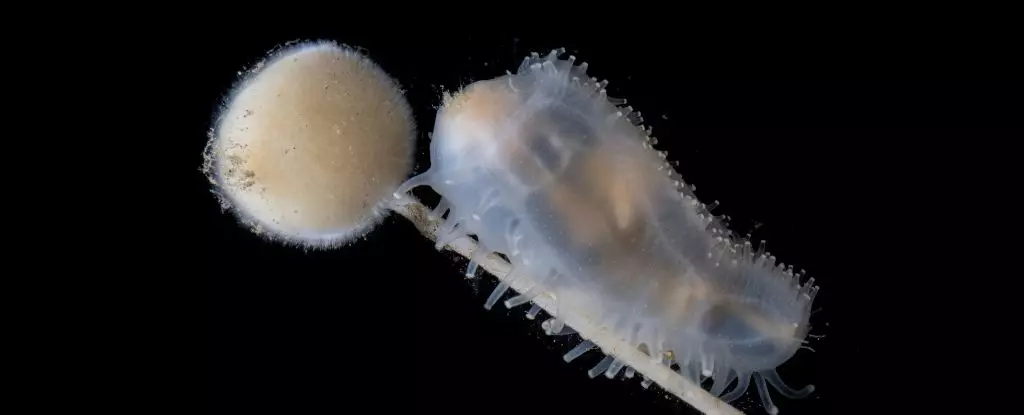In an age where human activity relentlessly pushes the boundaries of environmental degradation, the recent expedition by the Schmidt Ocean Institute aboard the Falkor (too) vessel serves as both a remarkable revelation and a dire warning. As an armada of scientists confronted the South Sandwich Islands near Antarctica, they simultaneously battled nature’s fury, facing relentless storms and treacherous conditions. This expedition, part of the comprehensive Ocean Census initiative, aims to document marine life rapidly disappearing due to climate change and the predatory practices of deep-sea mining. This pressing endeavor encapsulates the urgent need to safeguard the wonders of our oceans that many might never witness.
The stark contrast between the vibrant ecosystems they uncovered and the looming threats of industrial exploitation amplifies the emotional weight of this undertaking. Each discovery punctuates the sensational beauty of the marine environment while simultaneously highlighting its fragility. The stunning photographs capturing life around hydrothermal vents present a visceral reminder of what humanity stands to lose if we remain complacent in the face of ecological peril.
Illuminating the Depths: New Discoveries
Among the expedition’s wealth of discoveries, the sighting of a colossal squid—both magnificent and ominous—gripped public attention. Yet other creatures, such as a vibrant vermillion coral garden settling elegantly around Humpback Seamount, beckon further admiration. At depths of approximately 700 meters, these corals flourish in the shadow of towering hydrothermal chimneys, forming an unexpected oasis amidst the desolate deep. It’s as if nature’s artistry has carved out a sanctuary, thriving against the odds.
The eye-catching images of these underwater skyscrapers, teeming with barnacles, sea snails, and a panoply of shrimp gliding through the water, invoke a sense of wonder that is deeply human. Such beauty begs the question: how could we justify tearing into a world that holds such unexplored treasures? As hydrographer Jenny Gales eloquently stated, the discovery of these vents marks an unforgettable moment. However, it is not just the novelty that speaks volumes; it sheds light on the urgent need to better understand our oceans before they are irreparably altered or destroyed.
Uncomfortable Realities Beneath the Surface
Nevertheless, the expedition captures not only awe-inspiring sights. An unsettling scene of a grenadier fish, its gills invaded by parasitic copepods, reveals the harsh realities of survival in these frigid depths. Such images evoke a visceral unease, forcing us to confront the darker corners of nature, where beauty coexists with brutality. The stoic resilience of the stout sea cucumber, discovered at 650 meters, munching on a deep-sea puffball, stands as a testament to life’s tenacity, yet it is sadly overshadowed by nature’s cruelty.
Moreover, the unveiling of the elusive Akarotaxis aff. gouldae—a species of dragonfish long thought to evade discovery—speaks to both nature’s mystery and humanity’s ignorance. Species like this remind us that our understanding of marine biodiversity is not only incomplete but that so much remains hidden from view. The recent discovery of snailfish eggs clinging to black coral is yet another reminder that our oceans hold countless secrets. The ignorance of such basic facts, until now, is embarrassing for a civilization that prides itself on exploration and understanding.
A Call to Action in the Face of Vanity
As marine biologist Michelle Taylor pointed out, expeditions like these offer tantalizing glimpses into biologically rich realms of our ocean that humanity has scarcely begun to understand. However, they also emphasize the urgent reality: if we do not act swiftly to protect these ecosystems, future generations may inherit a barren ocean landscape stripped of its wonders. The Ocean Census serves as a clarion call; it underscores the critical need for sustainable practices and better governance of our marine environments.
In the face of advancing climate changes and growing industrial pressures, the revelations from the Falkor expedition are akin to a wake-up call. It compels us to re-evaluate our relationship with these extraordinary ecosystems. We have the opportunity to become stewards of the ocean rather than its exploiters. Such a paradigm shift is not merely desirable; it is essential for the preservation of the intricate tapestry that the ocean represents—a tapestry now revealed to us in stunning detail but under dire threat. Let us heed the call before it’s too late.


Leave a Reply